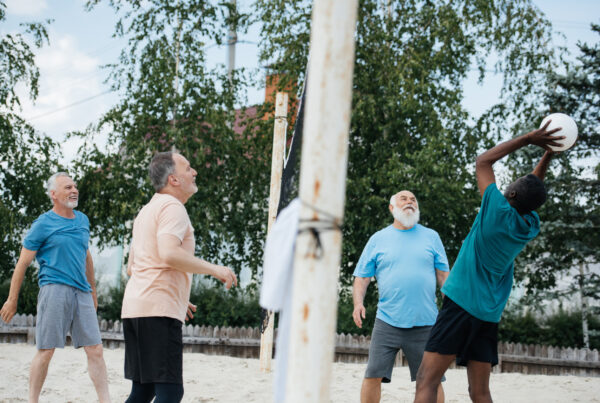”Question: How do I maximize muscle recovery after my workouts?
Reading time: 6 Minutes
MWi Hack:
- Maximize muscle recovery by focusing on basics like eating a balanced diet with adequate protein, staying hydrated, getting enough sleep, and avoiding alcohol and tobacco, rather than relying solely on expensive supplements or specialized techniques.
MWi Summary:
- Consume adequate protein (1.4-2.0g per kg of body weight daily) and carbohydrates post-workout
- Stay well-hydrated and consider cherry juice for its anti-inflammatory properties
- Prioritize quality sleep to allow muscles time to repair and grow
- Incorporate recovery techniques like massage, compression garments, or cryotherapy
- Avoid alcohol and tobacco, which can impair muscle recovery and increase injury risk
Many people believe they need expensive supplements to achieve results from their workouts. Although some supplements have benefits, you won’t maximize your performance unless you take care of the basics.
This article gives you 15 proven tips to maximize your muscle recovery and help you build a more consistent fitness program.
The foods people eat can profoundly affect athletic performance and recovery.
1. Protein post-workout
When you exercise, the proteins that make up your muscle fibers become damaged. Consuming protein after your workout can help give your body the raw material it needs to repair this muscle damage.
Research suggests that consuming roughly 1.6 grams (g) of protein per kilogram (kg) of body weight per day is enough to maximize muscle growth. The International Society of Sports Nutrition suggests a broader range of f 1.4–2.0 g protein/kg for building and maintaining muscle mass.
Consuming a high-protein meal or supplement pre- or post-workout can support muscle recovery and be a convenient way to achieve overall daily protein goals.
2. Protein pre-workout
Some people may find that consuming protein before a workout helps them reach their daily protein targets and increase muscle recovery.
However, studies show that while pre- and post-workout protein supplementation will support muscle development and recovery, overall dietary protein intake is more important than specific timings.
3. Carbohydrates post-workout
Your muscles store carbohydrates in the form of glycogen for energy. Glycogen is an important fuel source for all forms of aerobic exercise and the primary body’s primary energy source during high intensity anaerobic exercise.
Consuming carbohydrates post-workout with protein can help replenish glycogen stores and improve muscle repair and performance. The amount of carbohydrates a person requires will depend on body composition and exercise intensity.
4. Eat an overall balanced diet
Eating an overall healthy diet can ensure you don’t develop any nutrient deficiencies that may impair your muscles’ ability to recover.
As a general rule, this means:
- minimizing your consumption of ultra-processed foods
- eating plenty of fruits and vegetables
- healthy proteins such as beans and pulses, tofu, lean poultry, and eggs
- heart-healthy fats, such as olive oil, avocados, nuts, and seeds
Hydration is essential to exercise performance and recovery.
5. Stay hydrated
Dehydration can impair your muscles’ ability to repair themselves. You’re especially prone to becoming dehydrated if you exercise in hot or humid weather. To avoid dehydration, it is recommended that people drink 1.5 liters (L) for every kg lost during exercise. This equates to roughly 3 cups of fluid for every lb lost.
6. Cherry juice
Many athletes drink cherry juice as part of a healthy diet to reduce inflammation, muscle damage, and muscle soreness.
A 2022 literature review found consistent evidence that cherry juice taken in the days before exercise can support muscle recovery. However, further research must investigate the most effective forms, doses, and dose timings.
Certain supplements can help support an overall healthy diet. While it is often most beneficial to fulfill nutritional needs through whole food sources, powders, tablets, and other supplementation can help people conveniently reach their goals.
7. Creatine monohydrate
Creatine is one of the most widely studied supplements. Research consistently shows it can help improve muscular strength when combined with resistance training.
Studies also suggest creatine may help athletes recover from intense training by helping reduce muscle damage and inflammation, as well as aiding in replenishing your muscles’ glycogen stores.
8. Protein powder
Protein powder is a convenient way to add more protein to your diet. Many types of protein powders contain a complete spectrum of essential amino acids. Whey, soy, and casein protein powders are popular complete protein choices.
In addition to hydration, and nutrition, a person’s overall lifestyle habits play a key role in exercise recovery.
9. Sleep more
Sleep gives your muscles time to recover from exercise. People who exercise intensely need even more rest than the average person. Some professional athletes allegedly sleep 10 hours or more per night.
Research has found that sleep deprivation may impair muscle recovery by impairing the body’s inflammation reaction and the production of hormones that aid muscle growth.
10. Massage
Many athletes incorporate massage in their training to reduce muscle soreness.
A 2020 review of studies found that massage has a small but significant effect on improving flexibility and decreasing delayed onset muscle soreness after exercise.
11. Compression garments
Wearing compression garments has become common among athletes over the past several decades.
There’s a limited number of studies looking at their effectiveness for speeding up recovery from exercise. But a small 2019 study ound that they lowered time for body muscle recovery in German handball players.
In the study, the athletes wore the garments for 24 hours and then alternated between 12-hour breaks and 12-hour periods of wearing them for 96 hours.
12. Cryotherapy
Cryotherapy is the technique of exposing your body to an extremely cold temperature for a few minutes.
Research has found that it may speed up recovery by reducing pain, inflammation, and muscle tiredness after strenuous activity.
While many things can aid recovery, others can hamper it.
13. Alcohol
Consuming alcohol is detrimental to many aspects of your health – it can increase blood pressure, lower sleep quality, and duration, and has no nutritional value.
Consistently consuming alcohol may also slow muscular recovery and increase the risk of muscle loss in the long term.
14. Tobacco
Smoking tobacco negatively impacts your musculoskeletal system.
Although there’s a limited amount of research on the effects of tobacco on muscle recovery, there’s some evidence that smoking is associated with an increased risk of muscular injury.
Smoking tobacco is also associated with an increased risk of developing joint disease and an increased risk of fracturing a bone.
The time it takes for your muscles to recover from exercise depends on your fitness levels and the difficulty of your workout.
The volume, intensity, and duration of your workout all play a role in determining how taxing it is on your body.
After a relatively light workout, your muscles may be able to recover in 24 hours, whereas a more challenging workout might take two to three days. Very intense workouts might take even longer.
Other factors that can affect your recovery time include:
- how well you sleep
- how much nutrition you’re getting
- how much stress you’re dealing with
- doing exercises that involve many different muscle groups or a near max effort
The basis of any good training program is small incremental increases in intensity or volume over time. If you jump ahead too quickly, you put yourself at risk of injury or overtraining.
Different trainers have different philosophies when it comes to training. Many agree you should leave your workout session feeling challenged but not completely exhausted.
Even world-class athletes are strategic about which times or years they train at peak intensity.
Designing your program so you work alternate muscle groups in different workouts is a good way to increase the recovery period between sessions.
For example, if you are lifting weights three times a week, try a schedule like this to give each muscle group a full week to recover:
- Monday: Back and biceps
- Wednesday: Chest and arms
- Friday: Legs and core
You increase the risk of injury if you don’t let your muscles recover between physical exertions. Inadequate recovery from physical exertion can also decrease performance in subsequent workouts.
Repeated stress from exercise causes small tears called micro tears that make muscles feel sore and inflamed. An accumulation of tears puts you at risk of developing torn muscles, also called muscle strains or pulled muscles.






